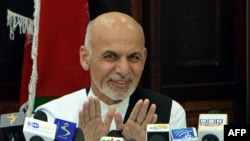Afghanistan’s new President Ashraf Ghani is on his first official trip to China amid optimism back home that increased Chinese diplomatic and economic engagement are important for bringing peace to his war-shattered country.
President Ghani will have a busy schedule during his four-day visit to Beijing, where he will hold “in-depth” talks with his Chinese counterpart, Xi Jinping, on bilateral and “issues of common interests.”
Ghani will also lead a delegation of Afghan businessmen at a meeting of Chinese investors in his bid to persuade them to develop the mining industry in his war-shattered country.
Afghans believe that China’s economic and diplomatic support can help their country overcome economic and security challenges after NATO troops withdraw from the country in December.
Janan Mosazai, Afghanistan's ambassador to neighboring Pakistan, said China is currently the largest investor in his country and bilateral cooperation has expanded in multiple areas.
“Over the past 13 years we have laid down the foundation of a very close enduring long-term relationship with China and both countries are determined to further develop and strengthen these relations in the years to come, starting with President Ashraf Ghani Ahmadzai’s state visit to Beijing,” said Mosazai.
In an interview published Tuesday by China’s state-backed Xinhua media organization, Ghani said he sees Afghanistan as a hub for regional trade and investment and he expects relations with China to expand.
China has largely avoided deepening its involvement in Afghanistan’s geopolitical affairs and confined its role to an economic investor in the country’s natural resource and energy sectors. It has invested nearly $7.5 billion and intends to enhance the Chinese economic footprint in Afghanistan.
In the last two years, however, Beijing has actively sought to redefine its relations with Kabul and has appointed a special envoy to Afghanistan to further its objective.
Sun Weidong, China's ambassador to neighboring Pakistan, made clear the importance of political stability for peaceful reconstruction of Afghanistan.
"China believes that the national reconciliation is an inevitable course for Afghanistan to achieve national stability and the prosperity,” said Weidong.
China is hosting this year’s Heart of Asia Istanbul Conference on October 31, a gathering of regional countries around Afghanistan that discuss ways to promote Afghan national reconciliation and peaceful reconstruction.
Ghani will also attend the event. Mosazai said the conference will go a long way in promoting regional peace.
“The fact that China, a key participant of the process, is hosting this ministerial conference at this historic juncture is testament to the importance and significance of this process to our collective efforts for better relations and closer cooperation in our region,” said Mosazai.
China is concerned that a security breakdown in Afghanistan after the withdrawal of international forces could fuel Uighur separatism in its restive Xinjiang border region. The Muslim insurgency, some Chinese officials suspect, has links to Islamist militants hiding in border areas of Afghanistan and Pakistan.
Afghan officials also believe China can use its influence with its long-term strategic partner, Pakistan, to persuade it to help Kabul promote reconciliation with the Taliban. Afghan officials have long believed the Taliban directs its insurgency in Afghanistan from safe havens in Pakistan.




